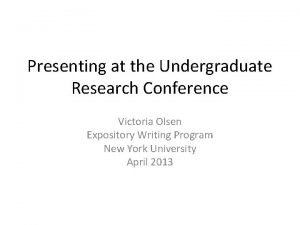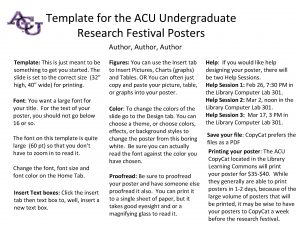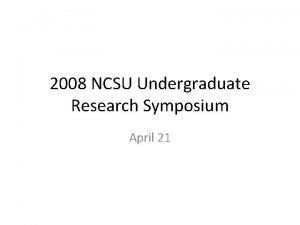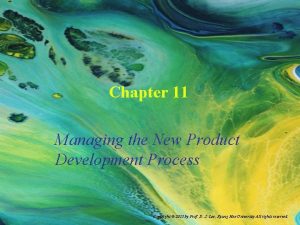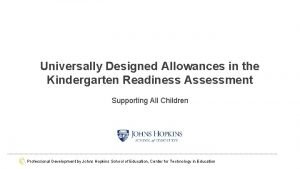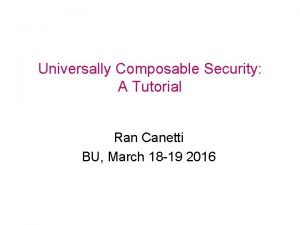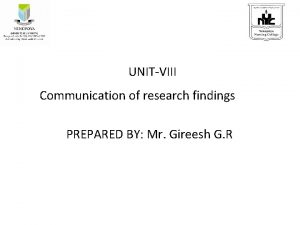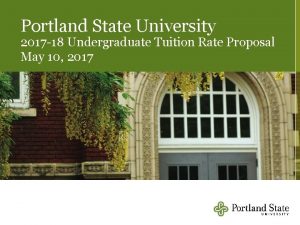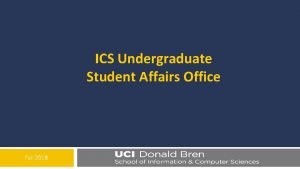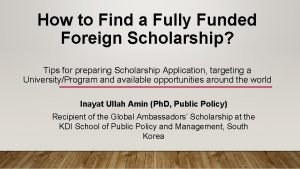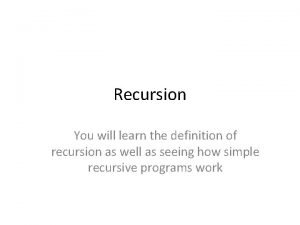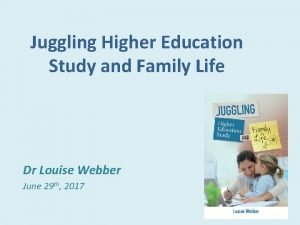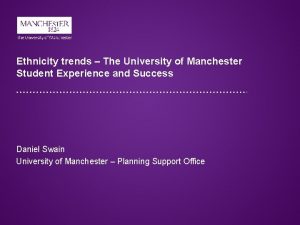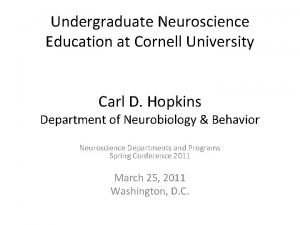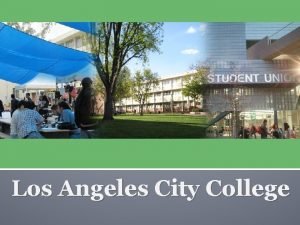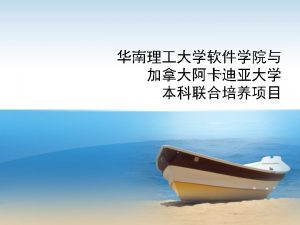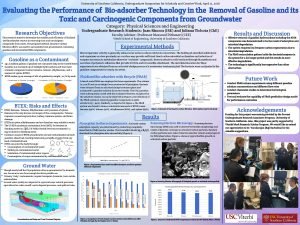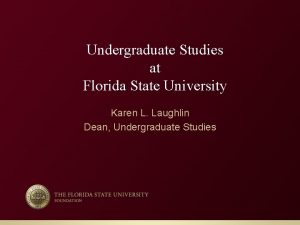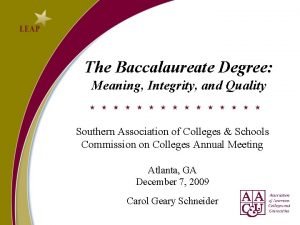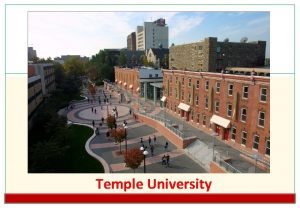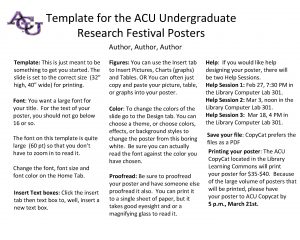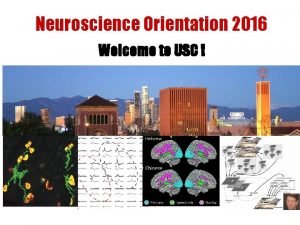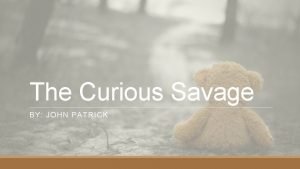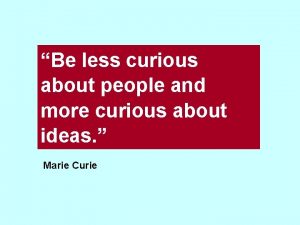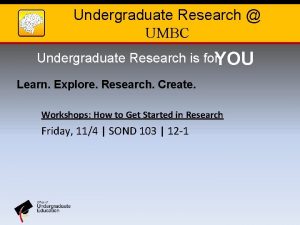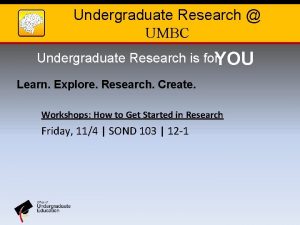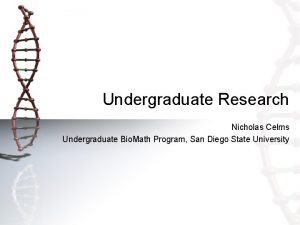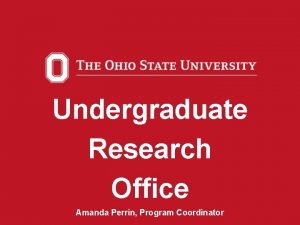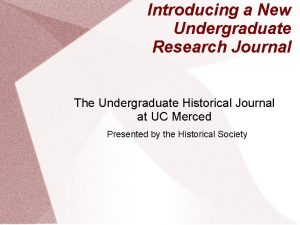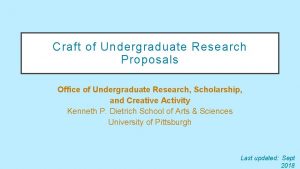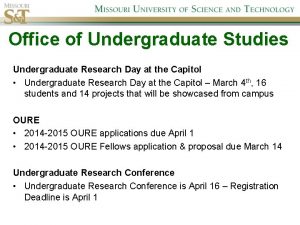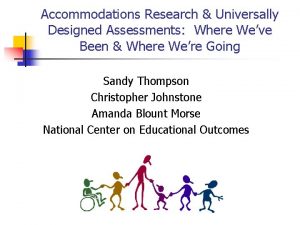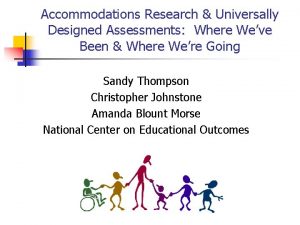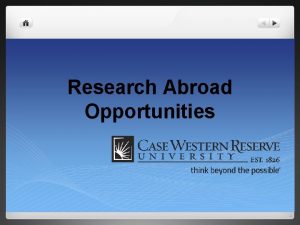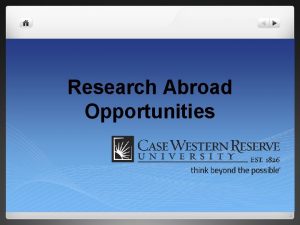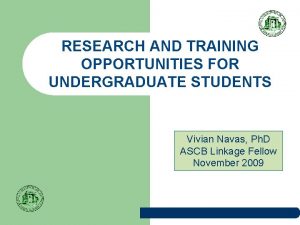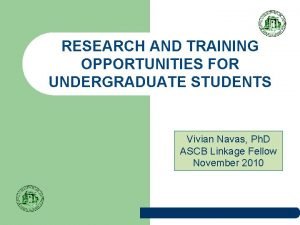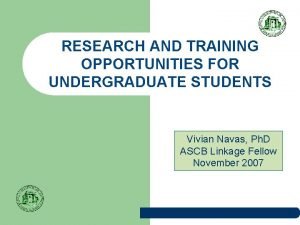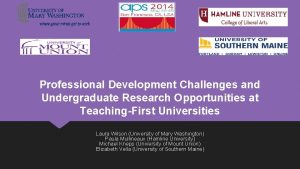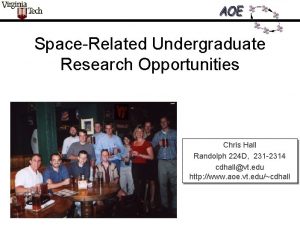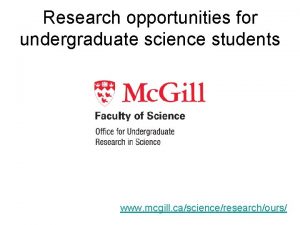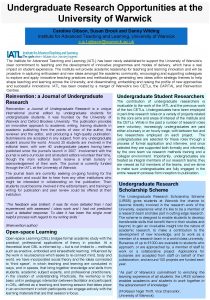CURIOUS Communicating Undergraduate Research Increasing Opportunities Universally for

























- Slides: 25

CURIOUS Communicating Undergraduate Research —Increasing Opportunities Universally for Success March 24, 2016

QEP Subcommittee Members Dr. David Leaver (Chair) Dr. Michael Ortiz Dr. Christopher Estepp Leslie Hopper Dr. Sharon Hileman Shannon Villanueva April Aultman Becker Cristal Maltos

Why Do I Need To Be CURIOUS? § "There are many messages, but all boil down to one: Go into science if you are curious and have passion for it. If not, find something else. . " Ada Yonath, Nobel Prize in Chemistry 2009 § “When you're curious, you find lots of interesting things to do. " Walt Disney § “If you’re not curious, you’re probably not a real scientist” Robert T. Pennock, Professor, Michigan State University http: //cen. acs. org/articles/91/i 32/Nobel-Laureates-Unveil-Secrets-Scientific. htmlto add text C&EN, 94, 22 nd February, 2016, page 1 http: //www. curiousmind. com/quotes_on_curiosity. htm

Alignment with SRSU Mission § The university will support research and creative efforts which advance knowledge, enrich teaching, and encourage professional growth. § The university will confirm that graduates demonstrate critical thinking skills, oral and written communication skills. . § The university will foster within students a spirit of intellectual curiosity leading to life-long learning. http: //www. sulross. edu/sites/default/files/users/docs/president/chapter_1. 02_mission_statement_rev_header. pdf

What is the Need? § Finding, understanding and using information is an important 21 st century skill § The ability to handle, analyze, and interpret data makes an individual valuable and marketable

"It Takes More Than a Major: Employer Priorities for College Learning and Student Success" Employers express the greatest confidence in the following practices to help students succeed beyond graduation, according to a 2013 study commissioned by the Association of American Colleges and Universities. Percentages indicate that employers believed the learning outcomes "will help a lot/fair amount" in preparing students for success: § § § Develop research questions in their field and evidence-based analyses (83%) Complete a project prior to graduation that demonstrates their acquired knowledge and skills (79%) Complete an internship or community-based field project (78%) Develop the skills to conduct research collaboratively (74%) Acquire hands-on or direct experience with the methods of science (69%) Work through ethical issues and debates to form their own judgments about the issues at stake (66%) https: //www. aacu. org/sites/default/files/LEAP/2013_Employer. Survey. pdf

What’s Been Happening @ SRSU? SRSU 2015 Undergraduate Research Experience & Advising Survey Results: § Library Research: � � 54% (n = 161) Reported having conducted library research or literature review 46% (n =139) Reported not conducting any research or literature review § Hypothesis or research question development: � � 29% (n = 87) Reported having developed a hypothesis or research question 71% (n = 213) Reported not developing a hypothesis or research question § Oral Presentations: � � 50% (n = 152) Responded presented an oral presentation in class during their time at Sul Ross 49% (n = 148) Responded not presenting an oral presentation in class during their time at Sul Ross Data Source: Leslie Hopper, Adelante Tejas Project Director

QEP GOALS § To enable SRSU undergraduate students to improve current communication skills (oral, written, visual, technological, performance) through basic inquiry or experience based research within their chosen field of study § To improve communication skills of students through problem-based learning § To enhance students’ information literacy skills

Experience-Based Research "Experience-based research is more than observation or information gathering. Research in this context. . . is engaging, is exciting, is enjoyable, involves analysis, original or creative thinking, . . . [and] leads to a product / outcome that can be shared. " University of South Florida QEP

Problem-Based Learning The Problem The Solution The Knowledge The Resources Adapted from: http: //cpanthro. blogspot. com/2013/04/problem-based-learning-and-stem. html

Other QEP Models § University of South Florida (USF) � INSPIRE – Infusing and Nurturing the Skills and Practice of Inquiry § Midwestern State University � EURECA – Enhancing Undergraduate Research Endeavors & Creative Activities § Georgia Institute of Technology � Strengthening Research Students the Global Competence & Experiences for Undergraduate

Existing Programs at SRSU § Mc. Nair Scholars Program § Borderlands Research Institute (BRI) § Rio Grande Research Center (RGRC) § Center for Big Bend Studies § Adelante Tejas Title V Grant § Capstone Courses § Alpine Honors Program

Suggested Programs § Enhancement of First Year Seminar § “Information Literacy” 1 SCH Course § International Programs § Study Abroad § Research Experience for Undergraduates (REU) NSF § Establish Honors Program at RGC

Suggested Student Learning Outcomes § Students will be able to: � Construct a research question or investigate a problem � Collect, evaluate, and interpret data and information that can be used to resolve the question or problem � Participate in experiential or service learning in collaboration with faculty, staff, graduate students, local community, etc.

Suggested Student Learning Outcomes § Understand symbolic, expressive and interpretive communication systems in all levels of complexity § Be prepared for research-based and creative careers or for graduate school § Communicate research findings through presentations that may be written, oral, visual, and/or performance-based § Engage the public communication through digital media

Suggested Assessments of SLOS § Oral and Poster presentations § “Information Literacy” hands on assignments § Research Projects, Independent Studies, Special Topics § Embedded Tasks in First Year Seminar & Capstone Courses

Suggested Activities § Mentored research § Guest speakers and § Online tutorials § Case Studies § Experience-based § Internships § Undergraduate opportunities research § Service learning in the community practitioners assistantships § Undergraduate research symposium

Readings and Research at RGC Rio Grande College (RGC): four campuses functioning as one § Mathematics capstone course for graduating seniors: offered since Spring 2012 • Students choose an advanced topic, research it, and prepare a written paper and oral presentation for fellow majors • Taught via distance learning (DL) using a teleconference system and Blackboard • Makes use of long-distance library resources available through SRSU and SWTJC • Students take turns presenting to one another using DL equipment throughout the semester

Suggested Professional Development § Attend Council on Undergraduate Research (CUR) Conferences • Faculty Workshops: Introducing New Methods for Teaching Students How to Access, Evaluate, and Use Information Ethically • Competitive Course Development/Research Grants aimed at Freshman and Senior Level Courses • Research and Communication Symposiums both at RGC (Uvalde) and Alpine

Information Literacy

Information Literacy Framework Click to add text http: //libraryguides. missouri. edu/c. php? g=249344

Information Literacy Course This course introduces students to lifelong learning skills that include acquiring and evaluating information, think critically about research strategies, ethical use of resources and apply these concepts to become an independent researcher. At the end of this course, students will have the ability to: § § § Examine information critically and determine its authenticity, credibility, intellectual content, bias, etc Determine the proper tool needed to locate desired information in the Bryan Wildenthal Memorial Library’s catalog, online databases, and the Internet Use and understand library reference tools and classification systems Use print, electronic, and Internet indexes in various academic disciplines to locate information Define and provide examples of ethical issues surrounding the use of information and sources Communicate their research coherently and responsibly

References § § § http: //cpanthro. blogspot. com/2013/04/problem-based-learning-andstem. html https: //www. pinterest. com/pin/89298005081195086/ https: //www. library. unt. edu/services/eagle-commons-library/collaborationand-learning-commons http: //cen. acs. org/articles/91/i 32/Nobel-Laureates-Unveil-Secrets. Scientific. htmlto add text https: //csumb. edu/uroc C&EN, 94, 22 nd February, 2016, page 1 INSPIRE, The USF Quality Enhancement Plan, January 2005 Expanding Horizons: Using Information in the 21 st Century, Trinity University, San Antonio QEP 2008 -2013 EURECA, Midwestern State University, QEP, April 2013 Strengthening the Global Competence and Research Experiences of Undergraduate Students, Georgia Institute of Technology, QEP, March 2005 Discovery-Based Learning: Transforming the Undergraduate Experience through Research, University of Houston QEP, February 2008

References § § § Blakemore, Tamara, and Amanda Howard. "Engaging Undergraduate Social Work Students in Research through Experience-Based Learning. " Social Work Education 34. 7 (2015): 861 -880. Camacho, Erika T. , Raquell M. Holmes, and Stephen A. Wirkus. "Transforming the Undergraduate Research Experience through Sustained Mentoring: Creating a Strong Support Network and a Collaborative Learning Environment. " New Directions for Higher Education 2015. 171 (2015): 63 -73. Lei, Simon A. , and Ning-Kuang Chuang. "Undergraduate Research Assistantship: A Comparison of Benefits and Costs from Faculty and Students' Perspectives. " Education 130. 2 (2009): 232 -240. Mabrouk, Patricia Ann. "What Knowledge of Responsible Conduct of Research Do Undergraduates Bring To Their Undergraduate Research Experiences? . " Journal of Chemical Education 93. 1 (2016): 46 -55. Wayment, Heidi A. , and K. Laurie Dickson. "Increasing Student Participation in Undergraduate Research Benefits Students, Faculty, and Department. " Teaching of Psychology 35. 3 (2008): 194 -197. Zimbardi, Kirsten, and Paula Myatt. "Embedding Undergraduate Research Experiences within the Curriculum: A Cross-Disciplinary Study of the Key Characteristics Guiding Implementation. " Studies in Higher Education 39. 2 (2014): 233 -250.

Video Acknowledgments § Glenn Losoya § Miranda Wauson § April Aultman Becker § Shannon Darr § Renne Estrada § Valerie Herrera § Taylor Rios § Jonathan Garcia https: //www. dropbox. com/s/bdx 5 pvcdm 57 z 5 au/QEP%20 Research%20 Questions%201. m 4 v? dl=0
 Types of hydrocele
Types of hydrocele Nyu undergraduate research conference
Nyu undergraduate research conference Acu undergraduate research festival
Acu undergraduate research festival Michael flavin
Michael flavin Ncsu undergraduate research symposium
Ncsu undergraduate research symposium Parallel development processes are universally endorsed.
Parallel development processes are universally endorsed. Kra universally designed allowances
Kra universally designed allowances Universally composable security
Universally composable security Findings in research
Findings in research Undergraduate meaninh
Undergraduate meaninh Portland state university undergraduate tuition and fees
Portland state university undergraduate tuition and fees Ics academic advising
Ics academic advising Undergraduate graduate postgraduate
Undergraduate graduate postgraduate Definition of undergraduate student
Definition of undergraduate student Difference between postgraduate and undergraduate
Difference between postgraduate and undergraduate Difference between postgraduate and undergraduate
Difference between postgraduate and undergraduate Cornell university neuroscience
Cornell university neuroscience Los angeles city college undergraduate enrollment
Los angeles city college undergraduate enrollment Acadia university undergraduate programs
Acadia university undergraduate programs University of southern california
University of southern california Fsu undergraduate studies
Fsu undergraduate studies Csub nursing program
Csub nursing program Baccalaureate degree meaning
Baccalaureate degree meaning Temple university undergraduate bulletin
Temple university undergraduate bulletin Acu copycat
Acu copycat Usc neuroscience major
Usc neuroscience major

